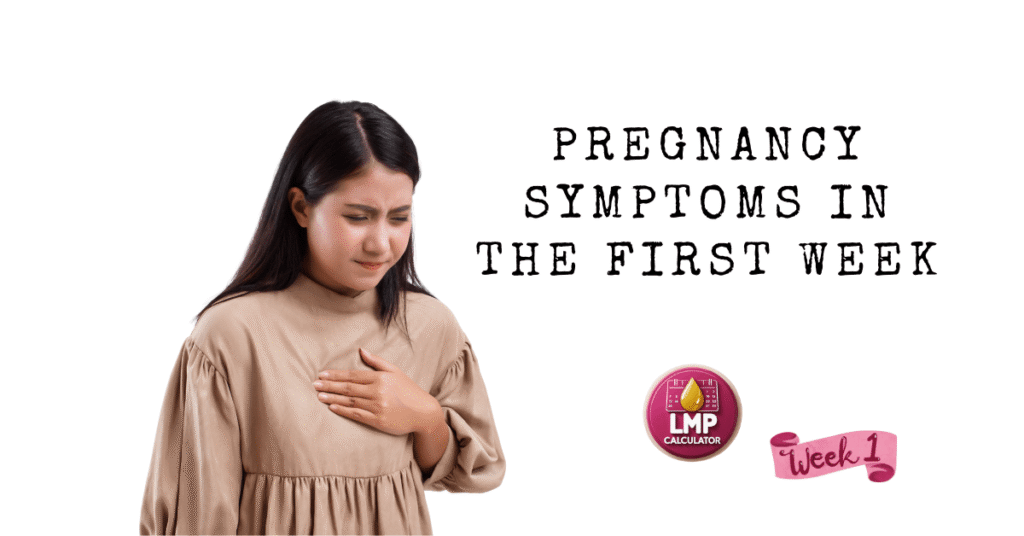Author & Reviewer Dr. Anuja Dokras, MBBS, DNB (Obs & Gynae)
Oxford-trained specialist in Infertility & Women’s Health.
Founder of LMP Calculator.
“The way pregnancy is calculated often creates confusion for women. When we talk about the ‘first week,’ it’s crucial to understand the difference between the medical definition and common perception. This guide aims to clear up that confusion and explain what is really happening in your body right after conception.”
Introduction: What Does the “First Week of Pregnancy” Really Mean?
When you search for “symptoms of the first week of pregnancy,” it’s essential to first understand how doctors calculate pregnancy.
- The Medical Definition (Clinical Week 1): For doctors, the first week of pregnancy begins on the first day of your Last Menstrual Period (LMP). During this week, you are not actually pregnant yet. Your body is simply preparing for ovulation (the release of an egg).
- The Common Perception (The Week After Conception): Most women think of the “first week” as the first 7 days following conception (fertilization). Medically, this is actually the third week of your pregnancy.
This article is written to address the common perception—the period covering the first week after conception.
Part 1: What Happens in the First 7 Days After Conception? (The Biology of Week 1 Post-Conception)
In the first week after conception, an incredible journey begins, but it all happens at a cellular level.
- Days 0-1: Fertilization: A sperm meets the egg in your fallopian tube, forming a ‘zygote.’
- Days 2-4: Cell Division and Travel: This zygote begins to divide rapidly, turning into a cluster of cells (a morula). During this time, it continues its journey from the fallopian tube toward the uterus.
- Days 5-7: Blastocyst Formation: This group of cells develops into a ‘blastocyst’ and reaches the uterus, where it floats around, looking for a good place to implant.
The Most Important Fact: During this entire week, the embryo is not yet attached to your uterine wall. This means no pregnancy hormones (like hCG) have been released into your bloodstream.
Part 2: So, Can You Feel Symptoms in the First Week?
From a scientific perspective, there are no pregnancy-specific symptoms in the first week after conception.
Any physical sensations you might feel (like mild cramping, fatigue, or breast tenderness) are caused by the increased levels of the hormone progesterone in your body after ovulation. This hormone rises during this phase of your menstrual cycle every month, whether you are pregnant or not. It’s a natural part of your body preparing for a potential pregnancy.
Expert Opinion – Dr. Anuja Dokras: “For the first 5-6 days after conception, your body does not know that it’s pregnant. It is very difficult to attribute any symptoms felt during this time directly to pregnancy. These sensations are typically caused by your normal hormonal cycle.”

Part 3: The Only Possible Sign at the End of the First Week
If there is one sign that might occur at the very end of this week, it is related to implantation.
- What is Implantation: This is the process where the blastocyst (embryo) attaches itself to the wall of the uterus.
- When It Occurs: This happens 6 to 12 days after fertilization. This means it could occur at the very end of your “first week post-conception” or at the beginning of the second week.
Potential Signs of Implantation:
- Light Spotting (Implantation Bleeding): A few pink or brown spots.
- Mild Cramping (Implantation Cramping): A light pricking or pulling sensation in the abdomen.
Please Note: Not every woman experiences these signs. Many women conceive successfully without noticing any implantation symptoms at all.
Part 4: Conclusion: What Should You Do This Week?
The first week after conception is a time for patience and self-care.
- Don’t Over-Analyze Symptoms: Since the symptoms this week can be misleading, avoid analyzing every little sensation. This will only increase stress.
- Adopt a Healthy Lifestyle: Act as though you could be pregnant. Start taking folic acid, avoid alcohol and smoking, and eat a balanced diet.
- Don’t Test Too Early: It is far too early to take a pregnancy test this week. Test kits detect the hCG hormone, which is only produced in the body after implantation has occurred.
Dr. Anuja Dokras’s Final Message:“The first week after conception is a silent but miraculous phase. It is completely normal to feel no symptoms at this time. Trust your body and let it do its work. The real, reliable signs of pregnancy will only begin to appear after implantation. Until then, stay calm and take care of yourself.”
Disclaimer: This article is for general informational purposes only and should not be considered a substitute for professional medical advice. Always consult your doctor or another qualified health provider with any health concerns.
